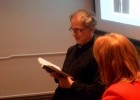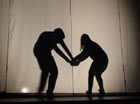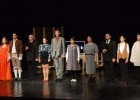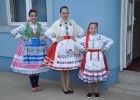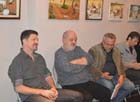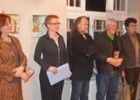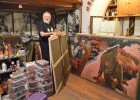CIVS database is richer of digitized recordings of folk songs
Since March parts of the series of Slovak folk songs of Vojvodina were gradually brought into the database. The abundant funds were provided by Jarmila Cinkotská, former editor of Radio Novi Sad, who has given these songs to the Institute. The digitized recordings are from various Vojvodina areas. The original material was recorded as one continuous recording that was recorded in the field on a magnetic tape strips. It was mostly about the original local folk songs and interviews with different personalities and performers. After completion of the digitization process the songs were separated individually from each other, which in turn allowed their storage and sorting into the database.
In total there are 390 songs and 60 interviews brought into the database. From the thematic aspect, the majority of songs is about love topics and only a minor part is about history and local events, least of all are the wedding and emigration songs. This is still only an indicative summary. Specific categorization and analysis of the inserted data is put as a challenge for experts from different fields who would like to address this issue. As an example we present a table, which shows the locations from which the material originates and its basic categorization.
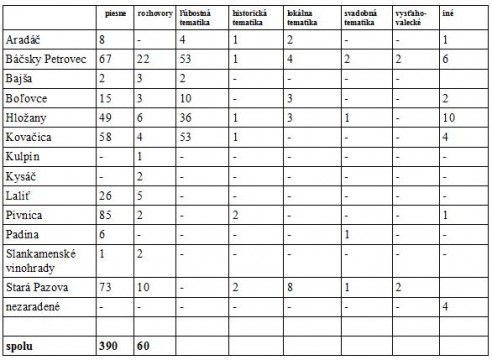 |
(Klikom každú ilustráciu možno zväčšiť.) |
The individual items in the database are classified only according to available information obtained from the source material (villages or name). Primary distribution of the introduced items is defined by genre, region where the recording comes from, than a more specific location, namely the village and at the end is the name of the artist (if known). For example:
 |
Potešujúci je fakt, že zachované piesne, sú v podobnom pomere z Báčky, Banátu a Sriemu. Pri niektorých nahrávkach boli uvedené i celé mená interprétov, niekde iba iniciály a niektorí zostali anonymní. Tak je napríklad zo Starej Pazovy: Marka Lakatošová, Lenhart, Šagová, Juraj Ondrík, Zuzana Slančíková, Zuzana Varecová; z brehov Pavel Lazár; z Pivnice: Bélová a Beden; z Kovačice Ďuriš a Ďarmotský; z Hložian: Báďonská a Dobrocká; z Petrovca: Drieňovská, Fabianová, Ušiaková a Dudášová.
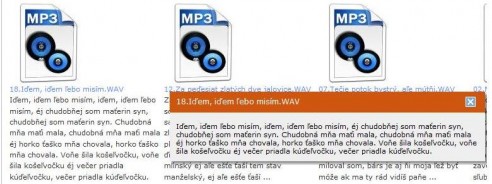 |
The song material, which was recorded in the period from 1966 to 1973 is a real treasury of folk art at the Lowlands. In particular, there are recorded original and traditional songs that nowadays can be heard only rarely. Mostly the young singers reach for these songs, who are seriously preparing for singing contest, or for a broadcast on Radio Novi Sad.
Besides the original songs from so called Lowland many others occur which are originated from different locations in Slovakia. Certain regions are where the Vojvodina Slovaks are originated from (eg Podpoľanie, Hont ...). So we present a sample of the same or equivalent wording of both enviroments.
 |
Most of the songs are love songs. In these songs almost all kinds of love is extolted, happy and unhappy stories, tragedies, various fanciful but are often referred to real situations. Some are written for a certain person, and adapted to the village in which it was sung. In those songs there are mentioned surnames, such as for an example songs from village called Laliť: Sýkora, Ďurík, Pišta, Zorňan, Banský, Pavlis, Ragová, Tereková, Valentová. Most songs are on this topic, but we wont specifically mention them now.
Songs with historical themes are rare. In this collection a song dedicated to the subject of Hungarian king (very great king of Hungary) is found in several locations. Between villages and interprets the distinction is often in the details, or is tailored to the specific names. The total content is substantially the same. For historic song it is characteristic that are rich with content and often have retold the whole story. Another example is: There was one Hungarian King, the Turkey wrote him back.
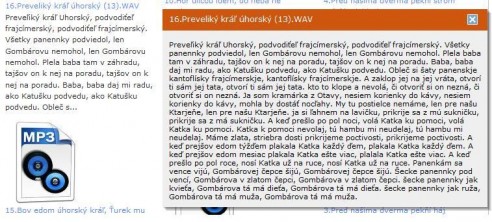 |
Example of a song from Pivnica (paraphrased):
There was a Hungarian king, the fraud of ladies, the ladies fraud. All ladies he cheated, just the maojors he couldn't, just the majors he couldn't. Once a grandmother weeded garden and the king came to her for a counsel, came to her for a counsel. Grandma' grandma' give me an advice on how I can seduce the majors wife, how I can seduce the majors wife. Put on a woman dress and a white gloves, and white gloves, you will go to his castle. You will knock on his doors and the father himself will open them, and the father himself will open them. I am a friend from Opava and I am carrying pepper to Prague, I am carrying pepper to Prague. I sent the cars ahead and I myself have stayed, and I myself remained. If you wont let me stay on a bench, at least let me stay under it and I will cover my self with my skirt. And after supper the lord hath commanded his daughter, the lord hath commanded his daughter. Go Juliška prepare your bed, the lady will sleep with you, the lady will sleep with you. I have never heard a thing like that, that a lady with a lady has slept, that a lady with a lady has slept. And at midnight cried Julka on her father, cried Julka on her father. Oh Juliška don't worry, we have silver and even gold, we have silver and even gold. Silver, gold lies in chests, my honesty is running away from me, my honesty is running away from me. And when it was already a week after, Julka cried every day, Julka cried every day. And when it was a month after, Julka cried even more, Julka cried even more. And when it was a year after, she was holding a little one on her arms, she was holding a little one on her arms. The lord holds his finger on Juliška. Oh, black eyed how that little one suits you, how that little one suits you.
When songs with the theme of emigration, leaving for America is mentioned, the difficult conditions in which they worked and their longing for home.
Preview song lyrics from Petrovec (paraphrased):
Oh, my Beloved God, what did my darling do. He went beyond the big water, he went beyond the big water, to work in a factory, to work in a Factory. American factories make calluses on your hands, American factories make calluses on your hands and there is also my beloved, and there is also a my beloved, my heart hurts after him, my heart hurts after him. When you come to the New York please write me a card, please write me a card, my dear wrote a card, my dear wrote a card, he sentit by telegraph, he sent it by telegraph, he sent it by telegraph.
Another range of topics is given to a local topic. There often occur specifications that are unknown not only to younger generations. Interesting is the song of Báčsky Petrovec that is bound to a local event. The editor of Radio Novi Sad went on the trail of the real people, respectively, people who knew them and remember the lyrics, which was based on real events of Petrovec:
What happened in the new broad street the man shot a girl. And when she was shot, she did not fall down, she did not fall down, just sat on the floor. On the ground she sat, and called her mother I'm shot, get a doctor, I'm shot. And when the doctor arrived, he sat next to her. He asked her Zuska what is wrong with you? Don't ask, just stop the blood take the bullet out that is under my heart. The bullet wasn't taken out, the doctor sent for the gendarmes. When the gendarmes came they found the bullet go after the fiance who shot the girl. And when the gendarmes went they did not find him at home but at Zuska Tušková's place, his faithful girlfriend.
Noteworthy is also the song from southern Báčka circuit, which refers to a local area names on which the shepherds grazed sheep and horses. The interesting thing here is that the text is not bound to only one village, but it mentions the surroundings, outside the current borders of the village in which the Slovak enclave lives.
 |
Besides folk songs the database is being filled with interviews that were part of the research. Originally, there were talks between the songs, but some were made specifically with a predetermined theme. The most numerous are about so called „priadky“ (it is an occasion when people got on together to sing, saw, entertain and just bond). The editor asked about various games and forms of entertainment that were during a period of priadky. Ultimately, there are records of many villages, citing the names, titles and descriptions of games and entertainment that was played during priadky.
For example the names of the games were (the names are listed in Slovak because they are in a specific local vernacular): Kresať kráľa; O ľubičke, Na krížnych cestách, Ľesa, ľesa - na Tomáša; Koborcovať, Sekanie uhlov, kartanie, Chodenie s medveďom, rozprávanie hádok, Pradenie nemej niťky, hra na pohreb, chodenie s paničkami, bozkávanie pod kochom...
Demonstration of a part from conversion from a Slovak village Hložany:
Interview about priadky. Priadky. Walking with the misstres; The cow was hewed - hew the cow; walking with the young brides, walking with monkeys; walking with bears; walking with a funeral; Wish: After the mountains after the pits, will you let us go to with the young brides…, etc.
Several interviews are about weddings and there are also several recordings with prominent musicians: sváko Durgala from Pivnica, Pavel Lazár from Brehy, uncle Ďurko Ondrík from Pazova, Ján Macák from Kysáč. They are made mostly in the form of free chat where musicians talked about their early experiences in a musical career.
Example from a Slovak village called Pivnica:
Interview with "sváko" (brother-in-law) Durgala. He began playing as a 12 year old boy. He took his father's violin and tuned it. He was self-taught. Father played the violin, grandfather, uncles... They also had a small bass. It was from Ján Bašta from Prague. From him the mother have ordered a violin, dulcimer and bass. He began playing alongside of musicians in the pub. In Pivnica there was Durgala, Rumanovský and Kábel orchestra. The musicians played the violin, first violin, second violin, bass ...
Example from a Slovakvillage called Slankamenské Vinohrady:
Interview with Pavel Lazár, here are just the basic theses that are mentioned. 1742 Pavel Lazár – musician, violinist. Born 23,12,1927 in Brehy (Slankamenské Vinohrady). He played a small primates. He has played Tambura (First) since childhood. Known musicians in the Brehy was also his father and grandfather and uncle. He learned how to play the violin when he was 23 years, when his father died. Weddings – he played on them a lot, he played on almost every wedding. Except songs from Brehy and Pazova he sang his own songs. First he wrote one verse, according to it he sets the music and then it was spinning. He wrote over 30 songs, and a lot of them also were finished up, after a few verses. The most famous is Fitoš and Kuľhavi. The Fitoš is called You people from Brehy who are you playing for. He has registered approximately 400 songs. Especially from Pazova and Brehy.
These given examples are only a part of the amount of the fund, which has great potential for further processing. Songs can be used on singing competitions, folk groups can incorporate them into their singing and dancing repertoires, musicians (not only folkloric, but also wedding) can learn something old (new) ... Experts, members of associations, choreographers, organizations can also use findings from interviews and on that basis create new things that will be based on the original, traditional materials.
 |




